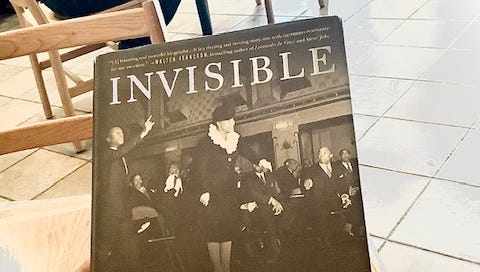The Trailblazing Black Woman Lawyer Who Took Down America’s Most Notorious Mob Leader
I’ve read scores of epic books during my lifetime. Among those that have resonated with me the most are biographies of Black women figures like author and filmmaker Zora Hurston, political leader and academic Condoleezza Rice, and millionaire businesswoman Mary Ellen Pleasant.
Whenever immersed in these sorts of books, I’m often reminded of my late mother, a woman whose strong resolve and set of values and principles heavily influenced the person I am today. In celebrating Black History month along with her enduring life legacy, I have been reading a book entitled “Invisible: The Forgotten Story of the Black Woman Lawyer Who Took Down America’s Most Powerful Mobster”
Stephen L. Carter, Yale University professor and author profiles Eunice Hutton Carter, his grandmother, who was a powerful influential Black women lawyer and prosecutor who achieved the unthinkable — spearheading the arrest and conviction of Lucky Luciano, America’s most prolific 20th-century mobster.
I found her story utterly fascinating, particularly in light of the enormous gender, racial and political barriers of her time. Riveting and moving, much like a page-turning novel, it unearths the story of Carter’s relentless quest to pursue justice in the world.
The book, though, is much more than simply a biography. Rather it provides a well-crafted historical context of Black life in the 20th century, one that resonates with present times. Eunice Carter passed away in 1970, while her grandson Stephen the author was in high school. Yet he recalls her as being “a stern and intimidating woman of advanced years.”
Carter was exquisite in his research for the book weaving a narrative that offers a deep look at why Eunice was such an extraordinary figure. I was particularly struck by his exegesis on how she brought down Luciano in 1936 and how it was tied to the Harlem prostitution rackets at the time.
Her evolution into this world was a fascinating one. She has the distinction of being only the second woman in the history of Smith College, a private liberal arts college in Northampton, Massachusetts, to achieve a bachelor’s and master’s in four years.
Later she graduated from Fordham Law School in New York before embarking on her own legal practice. In a few short years, she joined the New York City special prosecutor’s office run by noted political leaders Thomas E. Dewey. Not surprisingly, Eunice was the only Black American among Dewey’s hires
She also became a relentless campaigner for the Republican Party, believing that Democrats fostered racism and hate. As the daughter of William and Addie Hunton, two prominent civil rights advocates, she adroitly navigated her views amid her rising status and prevailing dictates of the times.
Black newspapers frequently highlighted Eunice’s rise as a prosecutor and public figure, noting her success for Dewey’s team with great pride. The Chicago Defender described her 1924 wedding to Lisle Carter, a New York dentist from Barbados, as “a very impressive ceremony” and “the topic of discussion among society folk.”
Over time Eunice Carter’s ascension was especially noteworthy given the pernicious impact of overt racism during her life. Despite being a rising star, she ended up being paid far less than white counterparts on Dewey’s staff and being passed over for high-level appointments, in favor of office peers.
Arguably, the biggest barrier she faced though was that of her brother and his fervent belief in Communism. Closely tracked by the FBI, his views eventually landed him in prison. This likely had an indirect, chilling effect on Eunice’s reputation and career.
The book also chronicles divisions in Eunice Carter’s marriage to her husband, along with her deep estrangement with her brother. The latter relationship was never fully repaired and the two eventually died within 10 days of each other.
In the end, Stephen L. Carter has revived his grandmother’s voice offering inspiration to women of today, particularly the growing legion of Black women in the legal profession.




